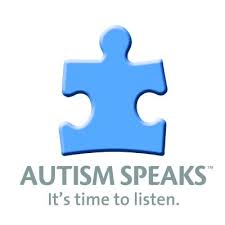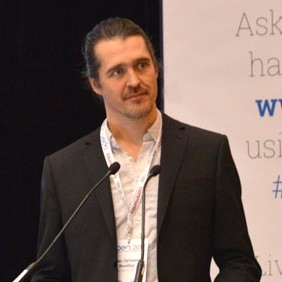 Autism Speaks, the world's leading autism science and advocacy organization, today launched the web-based portal for its MSSNG database, making the resource available to researchers worldwide. The MSSNG portal enables qualified scientists to access, study and share findings on detailed genomic information from people with autism spectrum disorder and their family members. Announced in December 2014, the MSSNG project (pronounced "missing") is a significant milestone in advancing autism research. MSSNG aims to sequence the complete genomes of 10,000 individuals affected by autism and their families by early 2016 - an unprecedented undertaking that provides the global autism research community with an open resource to answer some of the most vexing questions about the disorder. This could lead to breakthroughs in identifying the causes and subtypes of autism, as well as advancing the diagnosis and personalized treatment of the disorder.
Autism Speaks, the world's leading autism science and advocacy organization, today launched the web-based portal for its MSSNG database, making the resource available to researchers worldwide. The MSSNG portal enables qualified scientists to access, study and share findings on detailed genomic information from people with autism spectrum disorder and their family members. Announced in December 2014, the MSSNG project (pronounced "missing") is a significant milestone in advancing autism research. MSSNG aims to sequence the complete genomes of 10,000 individuals affected by autism and their families by early 2016 - an unprecedented undertaking that provides the global autism research community with an open resource to answer some of the most vexing questions about the disorder. This could lead to breakthroughs in identifying the causes and subtypes of autism, as well as advancing the diagnosis and personalized treatment of the disorder.
open source project
See the following -
3 Steps For Product Marketing Your Open Source Project
 Product marketing for COSS is materially different from product marketing for proprietary software and from general marketing practices like ads, lead generation, sponsorships, booths at conferences and trade shows, etc. Because the source code is open for all to see and the project's evolutionary history is completely transparent, you need to articulate—from a technical level to a technical audience—how and why your project works. Using the word "marketing" in this context is, in fact, misleading. It's really about product education. Your role is more like a coach, mentor, or teaching assistant in a computer science class or a code bootcamp than a "marketing person."
Product marketing for COSS is materially different from product marketing for proprietary software and from general marketing practices like ads, lead generation, sponsorships, booths at conferences and trade shows, etc. Because the source code is open for all to see and the project's evolutionary history is completely transparent, you need to articulate—from a technical level to a technical audience—how and why your project works. Using the word "marketing" in this context is, in fact, misleading. It's really about product education. Your role is more like a coach, mentor, or teaching assistant in a computer science class or a code bootcamp than a "marketing person."
- Login to post comments
6 Ways Programmers from Underrepresented Countries Can Get Ahead
 Becoming a programmer from an underrepresented community like Cameroon is tough. Many Africans don't even know what computer programming is-and a lot who do think it's only for people from Western or Asian countries. I didn't own a computer until I was 18, and I didn't start programming until I was a 19-year-old high school senior, and had to write a lot of code on paper because I couldn't be carrying my big desktop to school. I have learned a lot over the past five years as I've moved up the ladder to become a successful programmer from an underrepresented community. While these lessons are from my experience in Africa, many apply to other underrepresented communities, including women.
Becoming a programmer from an underrepresented community like Cameroon is tough. Many Africans don't even know what computer programming is-and a lot who do think it's only for people from Western or Asian countries. I didn't own a computer until I was 18, and I didn't start programming until I was a 19-year-old high school senior, and had to write a lot of code on paper because I couldn't be carrying my big desktop to school. I have learned a lot over the past five years as I've moved up the ladder to become a successful programmer from an underrepresented community. While these lessons are from my experience in Africa, many apply to other underrepresented communities, including women.
- Login to post comments
A Doctor Leverages Open Source to Learn How to Code And Improve Medical Care in Africa
 Judy Gichoya is a medical doctor from Kenya who became a software developer after joining the open source medical records project, OpenMRS. The open source project creates medical informatics software that helps health professionals collect and present data to improve patient care in developing countries. After seeing how effective the open medical records system was at increasing efficiency and lowering costs for clinics in impoverished areas of Africa, she began hacking on the software herself to help improve it. Then she set up her own implementation in the slums outside Nairobi, and has done the same for dozens of clinics since. This is a classic story of open source contributors, who join in order to scratch an itch. But Gichoya was a doctor, not a programmer. How did she make the leap?
Judy Gichoya is a medical doctor from Kenya who became a software developer after joining the open source medical records project, OpenMRS. The open source project creates medical informatics software that helps health professionals collect and present data to improve patient care in developing countries. After seeing how effective the open medical records system was at increasing efficiency and lowering costs for clinics in impoverished areas of Africa, she began hacking on the software herself to help improve it. Then she set up her own implementation in the slums outside Nairobi, and has done the same for dozens of clinics since. This is a classic story of open source contributors, who join in order to scratch an itch. But Gichoya was a doctor, not a programmer. How did she make the leap?
- Login to post comments
A Guide To Productivity Management In Open Source Projects
 Open source is one of the most important technology trends of our time. It’s the lifeblood of the digital economy and the preeminent way that software-based innovation happens today. In fact, it’s estimated that over 90% of software released today contains open source libraries. There's no doubt the open source model is effective and impactful. But is there still room for improvement? When comparing the broader software industry’s processes to that of open source communities, one big gap stands out: productivity management. By and large, open source project leads and maintainers have been slow to adopt modern productivity and project management practices and tools commonly embraced by startups and enterprises to drive the efficiency and predictability of software development processes. It’s time we examine how the application of these approaches and capabilities can improve the management of open source projects for the better.
Open source is one of the most important technology trends of our time. It’s the lifeblood of the digital economy and the preeminent way that software-based innovation happens today. In fact, it’s estimated that over 90% of software released today contains open source libraries. There's no doubt the open source model is effective and impactful. But is there still room for improvement? When comparing the broader software industry’s processes to that of open source communities, one big gap stands out: productivity management. By and large, open source project leads and maintainers have been slow to adopt modern productivity and project management practices and tools commonly embraced by startups and enterprises to drive the efficiency and predictability of software development processes. It’s time we examine how the application of these approaches and capabilities can improve the management of open source projects for the better.
- Login to post comments
A Mature API for an Electronic Health Record: the OpenMRS Process
 By some measures, OpenMRS may be the most successful of the open source EHRs, widely deployed around the world. It also has a long experience with its API, which has been developed and refined over the last several years. I talked to OpenMRS developer Wyclif Luyima recently and looked at OpenMRS’s REST API documentation to see what the API offers...
By some measures, OpenMRS may be the most successful of the open source EHRs, widely deployed around the world. It also has a long experience with its API, which has been developed and refined over the last several years. I talked to OpenMRS developer Wyclif Luyima recently and looked at OpenMRS’s REST API documentation to see what the API offers...
- Login to post comments
AllSeen Alliance Reaches 50 Members; Expands Smart Home, Connected Car And Security Focus
The AllSeen Alliance, the broadest Internet of Everything open-source project, today announced strong momentum in its mission to drive connectivity among devices, systems, services and the people they serve with the addition of six new members – GEO Semiconductor, Local Motors, Octoblu, Razer, Red Bend Software and Symantec...
- Login to post comments
An Open Source Project To Improve The Accuracy Of CDC's Mortality Data
 As part of the National Day of Civic Hacking, which will take place world-wide on Saturday, June 6th, CDC would like to launch an open-source project to develop a Cause-of-Death companion application that will a) help guide medical certifiers through the process of filling out a death certificate and b) provide real-time feedback for common mistakes at the point of data entry.
As part of the National Day of Civic Hacking, which will take place world-wide on Saturday, June 6th, CDC would like to launch an open-source project to develop a Cause-of-Death companion application that will a) help guide medical certifiers through the process of filling out a death certificate and b) provide real-time feedback for common mistakes at the point of data entry.
- Login to post comments
Anatomy of a Public Health Open Source Project: HLN's Immunization Calculation Engine (ICE)
 An immunization information system (IIS) aggregates immunization information for children (and some adults) living or receiving immunization services in a jurisdiction. One of the core components of an IIS is its immunization evaluation and forecasting system: the computerized algorithm that is used to determine if vaccine doses that were administered to the patient are clinically valid (evaluation) and to project what doses are due now and in the future (forecasting). These algorithms are used to support clinical decision support (CDS) at the point of care and also to help public health agencies understand and manage the immunization status of whole populations.
An immunization information system (IIS) aggregates immunization information for children (and some adults) living or receiving immunization services in a jurisdiction. One of the core components of an IIS is its immunization evaluation and forecasting system: the computerized algorithm that is used to determine if vaccine doses that were administered to the patient are clinically valid (evaluation) and to project what doses are due now and in the future (forecasting). These algorithms are used to support clinical decision support (CDS) at the point of care and also to help public health agencies understand and manage the immunization status of whole populations.
- Login to post comments
Attract Contributors To Your Open Source Project With Authenticity
 It's not a secret that maintaining an open source project is often thankless and time-consuming work. However, I've learned that there's one shared joy among open source maintainers: They love building with a group of technologists who passionately believe in their vision...Check out these methods that open source maintainers can use to attract contributors in a genuine manner.
It's not a secret that maintaining an open source project is often thankless and time-consuming work. However, I've learned that there's one shared joy among open source maintainers: They love building with a group of technologists who passionately believe in their vision...Check out these methods that open source maintainers can use to attract contributors in a genuine manner.
- Login to post comments
Autism Speaks launches MSSNG portal for open-access genomics research
- Login to post comments
Holochain – the Perfect Framework for Decentralized Cooperation at Scale
 Holochain is a new technology project with huge potential for the cooperative economy. Members of The Open Co-op have been promoting the idea that new software could, potentially, revolutionize both our failing democracies and our predatory capitalist economies, since 2004. Back then we weren’t quite so clear on exactly how the required information architecture should be designed – but we knew what we wanted it to do and how it should work. In 2004, I published a paper entitled Participatory Democracy Networks, which explained how I thought some new information architecture could facilitate participatory democracy worldwide.
Holochain is a new technology project with huge potential for the cooperative economy. Members of The Open Co-op have been promoting the idea that new software could, potentially, revolutionize both our failing democracies and our predatory capitalist economies, since 2004. Back then we weren’t quite so clear on exactly how the required information architecture should be designed – but we knew what we wanted it to do and how it should work. In 2004, I published a paper entitled Participatory Democracy Networks, which explained how I thought some new information architecture could facilitate participatory democracy worldwide.
- Login to post comments
How Open Data and Open Tools Can Save Lives During a Disaster
 If you've lived through a major, natural disaster, you know that during the first few days you'll probably have to rely on a mental map, instead of using a smartphone as an extension of your brain. Where's the closest hospital with disaster care? What about shelters? Gas stations? And how many soft story buildings-with their propensity to collapse-will you have to zig-zag around to get there? Trying to answer these questions after moving back to earthquake-prone San Francisco is why I started the Resiliency Maps project. The idea is to store information about assets, resources, and hazards in a given geographical area in a map that you can download and print out.
If you've lived through a major, natural disaster, you know that during the first few days you'll probably have to rely on a mental map, instead of using a smartphone as an extension of your brain. Where's the closest hospital with disaster care? What about shelters? Gas stations? And how many soft story buildings-with their propensity to collapse-will you have to zig-zag around to get there? Trying to answer these questions after moving back to earthquake-prone San Francisco is why I started the Resiliency Maps project. The idea is to store information about assets, resources, and hazards in a given geographical area in a map that you can download and print out.
- Login to post comments
How Open Source Builds Distributed Trust
 This distillation of collective experience allows what we refer to as distributed trust and is collected through numerous mechanisms on the internet. Some, like TripAdvisor or Glassdoor, record information about organisations or the services they provide, while others, like UrbanSitter or LinkedIn, allow users to add information about specific people (see, for instance, LinkedIn's Recommendations and Skills & Endorsements sections in individuals' profiles). The benefits that can accrue from these examples are significantly increased by the network effect, as the number of possible connections between members increases exponentially as the number of members increases.
This distillation of collective experience allows what we refer to as distributed trust and is collected through numerous mechanisms on the internet. Some, like TripAdvisor or Glassdoor, record information about organisations or the services they provide, while others, like UrbanSitter or LinkedIn, allow users to add information about specific people (see, for instance, LinkedIn's Recommendations and Skills & Endorsements sections in individuals' profiles). The benefits that can accrue from these examples are significantly increased by the network effect, as the number of possible connections between members increases exponentially as the number of members increases.
- Login to post comments
How To Make App Stores Friendly To Open Source
 Microsoft recently seemed to propose that Open Source software didn’t belong in the Windows app store. Excuse me? After the news broke, Giorgio Sardo, Microsoft’s General Manager of the Microsoft Store, argued on Twitter that it wasn’t Microsoft’s intent. “We absolutely want to support developers distributing successful OSS apps. In fact, there are already fantastic OSS apps in the Store! The goal of this policy is to protect customers from misleading listings.” Predictably, confusion results. And the kerfuffle over FairEmail and the Google Play Store earlier this year is a good example of how this sort of confusion is not entirely new, leading to questions about intent. I’ve talked with developers and business managers about their experience in preparing software packages for commercial app stores. Universally, everyone reports having issues with app stores’ packaging. These include...
Microsoft recently seemed to propose that Open Source software didn’t belong in the Windows app store. Excuse me? After the news broke, Giorgio Sardo, Microsoft’s General Manager of the Microsoft Store, argued on Twitter that it wasn’t Microsoft’s intent. “We absolutely want to support developers distributing successful OSS apps. In fact, there are already fantastic OSS apps in the Store! The goal of this policy is to protect customers from misleading listings.” Predictably, confusion results. And the kerfuffle over FairEmail and the Google Play Store earlier this year is a good example of how this sort of confusion is not entirely new, leading to questions about intent. I’ve talked with developers and business managers about their experience in preparing software packages for commercial app stores. Universally, everyone reports having issues with app stores’ packaging. These include...
- Login to post comments
How to Sell Open Source Software - Glyptodon's Success Story
 Every business model has its tradeoffs, with pros and cons. In the case of Glyptodon, they made a bet that they could build a viable commercial brand with 100% open source software. That bet has paid off, and it has allowed the Glyptodon founders to build a business without outside funding. The hope is that their story helps other entrepreneurs who are struggling with how to build a sustainable business selling open source software. For every company founder who was told it couldn't be done, Glyptodon wants you to know it is absolutely possible-you can build and sell open source products. The key is to establish a trusted commercial brand and sell the overall solution.
Every business model has its tradeoffs, with pros and cons. In the case of Glyptodon, they made a bet that they could build a viable commercial brand with 100% open source software. That bet has paid off, and it has allowed the Glyptodon founders to build a business without outside funding. The hope is that their story helps other entrepreneurs who are struggling with how to build a sustainable business selling open source software. For every company founder who was told it couldn't be done, Glyptodon wants you to know it is absolutely possible-you can build and sell open source products. The key is to establish a trusted commercial brand and sell the overall solution.
- Login to post comments